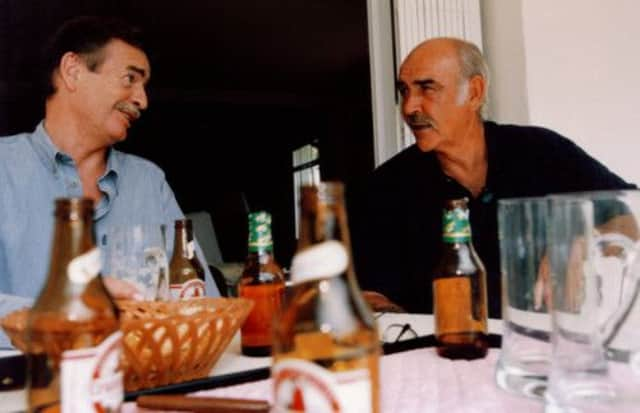McIlvanney work-in-progress on Connery goes online


AT 76, William McIlvanney is enjoying a “genuine resurrection”.
The author of Docherty and the Laidlaw triology has been discovered by a new generation of readers after publisher Canongate reissued his earlier books, and fans will be delighted to hear that he is now putting more of his unpublished work online.
Advertisement
Hide AdIn an interview with Scotland on Sunday, McIlvanney revealed that he plans on building a “substantial archive” online, which will include several chapters from his latest work-in-progress, a book about Sir Sean Connery.
The unconventional biography called Almost A Book About Sean Connery, has encounted resistance from publishers who rejected it as not “properly mass-market” and “uncategorisable”.
Undeterred, McIlvanney, who has collaborated with Connery on a number of film projects and interviewed the actor, has posted online an introduction and four chapters, totalling nearly 12,000 words of the 90,000 penned to date.
“I wouldn’t offer a book to the public without being sure it’s what I want,” he explained. “This is a halfway house. I’ve put a lot into writing it, and what I’ve written I believe in. It’s just that I felt it lost direction. I might finish it and I might not.”
Besides the Connery book, McIlvanney will publish another work, billed as a dictionary of personal experience, on the website called Personal Dispatches.
The website, which is run by McIlvanney’s nephew, Neil, draws upon work never before seen as well as a gamut of poetry, essays, journalism, and television reviews.
Advertisement
Hide AdAlso included are MP3s of readings, scans of longhand drafts, and photographs. Only recently set up, the online canon already totals more than 47,000 words.
McIlvanney said: “I’ve got stacks of material at home, I’ve been writing notes manically since I was about 17. It’s mainly shite but there are acres of the stuff. Sometimes they expand into a piece, sometimes they don’t. I think there’s quite a healthy backlog of work.
Advertisement
Hide Ad“Just putting it on the internet will allow me to crystallise a lot of very vague ideas. It has made me look at what I have written more carefully, and it may come to something more significant.”
Neil, an English teacher at Kilmarnock Academy, said his uncle has never used a word processor or computer, but proposed the idea of a website while they were having a drink.
He said: “I thought that Willie’s idea to feature unpublished work was really quite bold. However, I also understood the rationale that his unpublished writing would be better on a website being read by people than in a desk drawer in his study being read by no-one. I also thought that if the unpublished work got a good reaction it might lead to some of it being published in book form.”
The new venture, along with the new audience for his earlier work, has reinvigorated McIlvanney. “It’s been stunning, a genuine resurrection for me,” he said. “Last year at Edinburgh Book Festival, I was in a wee tent with three other writers and we got 120 people, and I thought, ‘Aye, this is where we are’. But now is a transformative time. It’s like discovering folk like you. Where I come from, you don’t assume that.”
In addition to his writing, McIlvanney is involved in tentative plans to bring the Camus-reading Detective Inspector Jack Laidlaw, to the small screen.
He is currently in discussions over a three-part adaptation of the original trilogy for television. Having explored an abortive attempt to turn Laidlaw into a film with Connery, the author is optimistic, explaining: “I’m at the stage of talking about it with people, and I would like to see it realised, I’m very fond of it.”
Advertisement
Hide AdOne project that McIlvanney says he is not involved in is helping to write the white paper on Scottish independence. Last month it was reported that senior figures in the Scottish National Party had put the novelist at the top of their wish list of writers to add a literary flourish to the white paper due out in November.
But McIlvanney says he has not been approached. “It’s news to me,” he said. “Nobody has asked me about it.”
Advertisement
Hide AdAlthough he is almost sure of how he will vote in next year’s referendum, McIlvanney is critical of the “obfuscation” which has characterised the independence debate.
“I think I know how I’m going to vote, but I don’t know if I’m confident enough in my decision to try and persuade others to do the same,” he said. “I would mainly just want people to vote. It’s a ‘come ahead’ moment for Scotland, and whatever the decision, a massive silence wouldn’t impress. For several generations, this is the last throw of the dice. This is not going to recur for a long time.”
“The main feeling I have so far is obfuscation. Like most punters, I’m getting so many contradictory messages. I would like some kind of authoritative clarification of where we are.
“I doubt that will come, but that is what people deserve; not the decoration of an argument to support a case effectively, but a serious, neutral attempt to define the issues, the problems, and the possibilities. The country deserves as much honesty as can be mustered.”
McIlvanney’s website is at www.personaldispatches.com